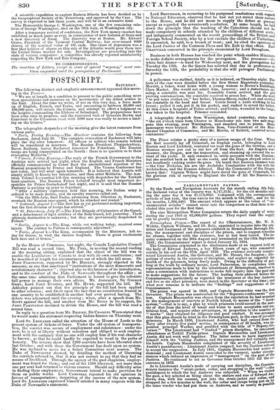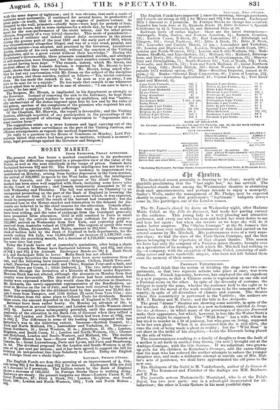PARLIAMENTARY PAPERS.
By the Trade and Navigation Accounts for the month ending 6th July, the declared value of the exports was 8,747,3131.; for the six months end- ing. the same day it was 49,173,0021. Compared with the corresponding periods of last year, the true excess for the month is 934,9081., and for the six months, 1,566,446/. The amount which appears as the value of "an- enumerated articles" cannot enter into the comparison as that item is in- cluded this year for the first time.
The nine Metropolitan Water Companies return the daily supply of water during the year 1853 at 62,000,000 gallons. They report that the supply can be greatly increased.
Birmingham Prison.—The report of the Commissioners, Mr. W. N. Welsby, Captain Williams and Dr. Baly, appointed to inquire into the con- dition and treatment of the prisoners confined in Birmingham Borough Pri- am, the management and discipline of the prison, and to suggest remedies for abuses, together with the evidence, has at last been issued. The in- quiry commenced on the 30th August and terminated on the 13th September 1853; the Commissioners' report is dated January 25, 1854.
The Commission originated in the disclosures made at an inquest held on
the body of Edward Andrews, a boy fifteen years of age, who committed suicide in his cell on the 27th April 1853. The evidence seriously compro- mised Lieutenant Austin, the Governor, and Mr. Blount, the Surgeon ; alle- gations of cruelty in the exercise of discipline„ and neglect as regarded the health of the prisoners, being freely made. Owing to the difficulty of get- ting at the truth by ordinary means, Lord Palmerston in compliance with representations made to him by the inhabitants of Birmingham, resolved to issue a commission with instructions to make full inquiry into the past and to make suggestions for the future. The leading facts adduced before the Commissioners, particularly as regarded the treatment of the boy Andrews and five or six other prisoners, were stated in the Spectator at the time; and what now remains is to indicate the "findings' and suggestions of the Commissioners.
The prison was opened in 1849, and Captain Maconochie was the first
Governor. The prison was constructed for the "Separate confinement" SP- tem. Captain Maconochie was chosen from the reputation he had acquired in the management of convicts at Norfolk Island, by means of the " mark- system,"—that is to say, a plan by which prisoners could ascend in the mat- ter of diet from the level of bread and water to more acceptable and nu- tritious food, and acquire other advantages, in proportion to the number of " marks ' they obtained for diligence and good. conduct. It was arranged that this plan should be tried in the Birmingham gaol, in the case of juvenile prisoners. In March 1850, Lieutenant Austin, who had retired from the Navy after twenty-five years' service,. in consequence of ill health, was ap- pointed principal Warder, and gratified with the title of " Deputy:Go- vernor." The Lieutenant had " studied " prison discipline, by occasional attendances at Tothill Fields prison. Captain Maconochie and Lieutenant Austin did not work well together. The latter seems to have ingratiated himself with the Visiting Justices, and the management fell virtually into his hands. Captain Maconochie complained of the severity of Lieutenant Austin's punishments : Lieutenant Austin resigned, but the Justices refused to accept the resignation. In July 1851, Captain Maconochie had notice of dismissal; and Lieutenant Austin succeeded to the-vacancy, under circum- stances which induced an impression of " management " on the part of the Justices. He continued to act as Governor from October 1851 till the oc- currence in 1853. As to Lieutenant Austin's mode of carrying out discipline, the Commis- sioners instance the "strait-jacket, collar, and strapping to the wall"--the punishment to which the boy Andrews was subjected. "When we visited the gaol, a boy selected as being about the stature and size of Edward An- drews, was, with his consent, put into the strait-jacket and collar, and strapped for a few minutes to the wall, the collar and straps being put on by the same warder who had put them on Andrews, and as nearly as possible
five,
went for the non-performance. of the crank labour, and for other prison offences, uently of a very trivial character. This mode of punishment— which was of ordinary and indeed almost daily occurrence in the prison during the greater part of the year 1852 and the early part of 1853, which was unquestionably altogether illegal, and was of a very cruel, painful, and irritating nature—was adopted, and practised by the Governor, Lieutenant Austin, entirely of his own authority, without the sanction of the Visiting magistrates, and to a great extent without their knowledge." During the Lieutenant's Governorship, three prisoners committed suicide, and attempts at self-destruction were frequent ; but the exact number cannot be specified, no record having been kept. " The remark, indeed, which Mr. Green, the medical officer of the Lunatic Asylum, is reported by Mr. Blount to have male, shows that they were very frequent. Mr. Blount, being asked whe- ther he had any conversation with Mr. Green on the subject of the discipline of the prison' and these suicides, replied as follows—' Yes, trivial conversa- tions. Re has made the remark to me, "As soon as you go away, I am sure to be sent for to a suicide." He has made that remark to me whenever I have asked him to attend for me in case of absence ; "I am sure to have a suicide," he has said: " The Surgeon Mr. Blount, is implicated in his department as strongly as the Governor. 'Instead of removing the sick to the Infirmary, he kept them to their cells; employed warders to make up medicines, and was " hebitu- ally unobservant of the duties imposed upon him by law and by the rules of the prison, careless of the complaints of the prisoners who required his aid, and devoid of sympathy with their sufferings.'
Of the Chaplain, Mr. Sherwin, the report is favourable; and the Visiting Justices, although acquitted of any participation in the proceedings of the Governor, are accused of allowing their supervision to "degenerate into a mere routine form." The suggestions relate to a more humane and legal carrying out of the prison discipline, better surveillance on the part of the Visiting Justices, and efficient arrangements as regards the medical department.
[In reply to a question in the House of Commons on Monday; Lord Pal- merston stated that orders had been given to institute, without a moment's delay, legal proceedings against the Governor and Surgeon.] with the same degree of tightness; and it was obvious, that such a mode of restraint must necessarily, if continued for several hours, be productive of great pain—in truth, that it must be an engine of positive torture. So strapped to the wall, prisoners—chiefly boys—were kept for periods of four, A • hours., and in some instances for a whole day, by way of punish-



























 Previous page
Previous page